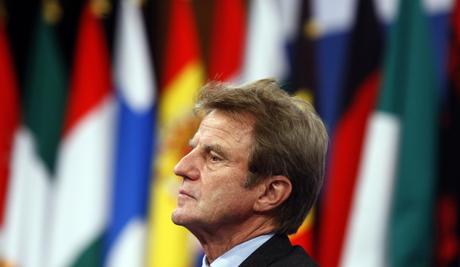
It is difficult for personalities with such prolific lives as the doctor and French politician Bernard Kouchner (Avignon-1939) not to provoke admiration and controversy. His political life, apart from the legendary May of '68, developed through his ministerial positions in the governements of Mitterrand and Sarkozy, demonstrating his independence. Moreover, he has been a UN Special Representative and Head of the United Nations Interim Administration Mission in Kosovo (1999-2001). He has also published numerous books, articles, and essays. But the most oustanding accomplishment is his humanitarian work started in 1968 when he traveled with the Red Cross to Biafra, Nigeria. This experience moved him very deeply, leading him to establish the non-governmental organization, Doctors Without Borders (1971), which made him worthy of winning the 1999 Nobel Peace Prize. In addition to this accomplishment, he was also the founder Doctors of the World (1980). Kouchner has been present since the beginning of many great natural and politial disaters in the world by assisting and alleviating the pain of the civilian victims of both wars and catastrophes.
E.C: We are flying over African territory, where everything started. What do you think the future holds for Africa?
B.K: Well, just a few words on the past of Africa: it has a past of battles and difficulties, but the group of people existed already and ISIS existed, although it was not as unethical… And when a colonisation came, all the colonisation, I mean the Portuguese, the Spanish, the French, the Indian, the British, they kept all the population in peace. And sometimes they cut families into parts. As ever, all the colonial lines were at the pressure of the battles, the armies, and after we used to say that we had to keep the countries like we were conquering them. I was not on a side but it was difficult. Sometimes it happened that we corrected the countries like it has been done between Ethiopia and Eritrea. Was it a good thing? I mean, trying to reproduce the borders of the people and the borders of colonisation? I don’t know, because Eritrea and Ethiopia are independent countries but they are fighting each other so I think that the old, wise decision to keep the border like it is - of course it’s an obstacle for the future, but it is like that, we cannot change completely now. So the future of Africa is certainly a big transformation, a big change, a big jump in the 21st century. First the population of Africa is important. We know that two billion will come in the coming century - before the end of the 21st century, so a very big potential for people. Will it be possible to educate them enough, because of the number of them? Yes, I hope it will be done by an international effort. This a huge continent, with space. For us - for Europe, we are all considering Africa like a free territory; like part of the future of humanity, that’s for sure. That’s why it was so important for the people of the bank - the bank of Dakar - to start in a country where democracy already existed. And Senegal is the best example of a democratic country in Africa. So it’s very important to start from a solid start, like in Senegal. Not all of the countries are looking like Senegal. We cannot answer to such a question, ‘yes, Africa is part of the future of humanity, it’s a continent in progress’ without a few words on terrorism and extreme Islamism. We have to fight against that, and today Nigeria is one of the most important countries in Africa. In Nigeria, business is developing, people are working very quickly. They have to take Boko Haram and the massacres of the women and the young people and the kidnapping, all this babarian attitude very seriously. And I hope it will be done by a sort of coalition of people. It will chat to Niger, etcetera. That’s very important also for the future. For their economical future and their political future. For the political with their particular forms, the future should be democratic. With an African style of course, an African conception of the word.
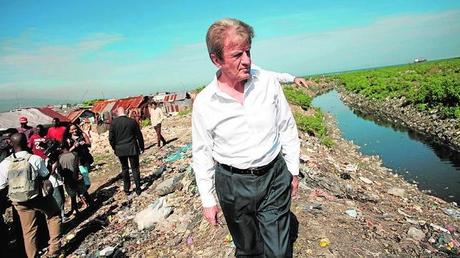
E.C: In 1979 you chartered a hospital ship, that was named Ile de Lumière, with a mandate of helping political refugees to run away from the communist regime of Vietnam in smalls boats.Do you think the Île de Lumière would be a utopia today given that thousands of Africans throw themselves to sea in search of a better future?
B.K: Yes. Formerly, we were talking about how, over the rest of the century, Africa is changing. But today, the most important question for them, and for us in a way, not the only one but an important question – is migration. What are we supposed to do, facing migration? First, we cannot stop the flood. It will take time, it will take years and years. Because the people there are not coming to us - to Europe for the pleasure of the country, they have to because of the poverty, the misery. They are fleeing out of misery. Out of misery, because there is no future – no immediate future – for their families. They have to feed their families. And in some countries like Mali, it is culturally necessary to leave and to go to France. And there are places where, if you’re arriving at the age of being an adult, you have to leave and find a job to send money back to your family. First point: they are not coming to please us, or to fight us. They are coming because misery is high, immense. Second, the TV representation for them, they believe that arriving in Europe they will find a job immediately and become rich, but this is not true. Because we are crossing a big crisis. And even in our country, unemployment is a big problem. So unemployment and migration, this is very difficult. We should nor confuse the « migrants « ,general speaking, and the asylum seekers. Those people leaving from a war, a dictatorship, those who cannot come back home without risking their life, being jailed or tortured should be accepted, along the terms of the Genova convention (1951). We are talking here about «economical migrants», not protected by Geneova Convention.
But first, we cannot mix even if it is impossible we cannot intellectually, in consideration of the people dying in the Mediterranean Sea. We cannot say ‘yes, but there are 11 migrants’, all migrants are fleeing for economical reasons and not political reasons. They are illegal, so we should rescue them. This is a moral obligation. This is very difficult to explain to the people and that’s why, as we are refusing massive migration, the people believe that we shouldn’t save the people. Some of them believe that we don’t have to send them a rescue belt or a rescue jacket. No, even if, after they come to Italy or to France or to Spain, we cannot just let them die. This is impossible for me. For me, even if we haven’t solved the problem of immigration in our country, we improve the number of people accessing our place. But two answers: first, we cannot say ‘we should think about a new general convention’ because the general convention obliges the countries to give asylum for political reasons if they cannot go back to their countries because of dictatorship, or because of racial attitudes. If it is too risky for them to go back, we have to give them asylum. This is the general convention, I think '54? And we are obliged, we signed the general convention. But the people, the migrants, the majority of them are coming because they are fleeing out of misery, as I told you. Not because of dictatorship, not all of them - Eritrea certainly. They are also fleeing for war reasons - the Syrian people, the Iraqi people. So it is very difficult just to separate now economical migration and political migration. First point: Europe exists. If Europe exists, this is not to let them die in the Mediterranean Sea. And I gave you the example already of the French boat: we sent seven of them to the China Sea – 12,000 km away, when the boat people were swimming to Vietnam. We were good to do so. The Mediterranean Sea is our sea: the sea of our culture, the sea of our holidays, the sea where we lie in the sun on a white beach. So we should rescue. Europe’s answer was very slow and it was an impossible, unfair and cold answer. We let them get on shore in Italy, the big majority. Of course, because Italy is the nearest country and the people are leaving from Libya and from that whole coast. Because of the commercialisation of slavery, all of these people, the migrants pay between one thousand dollars and seven to ten thousand dollars. All the efforts of their family during their whole life. And of course, these people, the merchants of slavery, they promise ‘you will find…’ etc. And they promise access to Great Britain across the channel, but no, it is impossible. So, the first answer should be coming from Europe – we have to share the burden, not to let them stay in Italy by thousands and thousands and ten thousands. No, we have to share the burden and we need to answer the proposal coming from the new commission - The Russell Commission. And this is absolutely no-one. The twenty-eight countries have to change. And the proper numbers – I remember from my country it was around seven thousand people. It is not so large! We are sixty-seven million now. So we have to share, all the twenty-eight countries. But they didn’t answer yes! They failed to listen. First answer: sharing in twenty-eight countries according to the number of people - the demographic, and second, the richness. So they did the calculation and then Jean-Claude Juncker proposed: first we have to rescue them. And not only the Italian boat and saying thank you to the Italian people and thank you to some of the Spanish people when they were coming from Libya and from Morocco etc. We cannot let them die. So let’s send one boat per country. Twenty-eight boats, this is nothing for the country. And if the country has no access to the seas they have to rent a boat! This is nothing. The second answer is sharing the burden, not letting the Italians accept all the numbers. And after, according to the Schengen Law, to cross the border and to be joining, say, Sweden, etc. That’s my answer. We should see this complicity of murder, not helping them in the sea, second, immigration is a problem. Do we have to change with a new answer of the general convention? I think so, it will be very difficult, but we should do it.
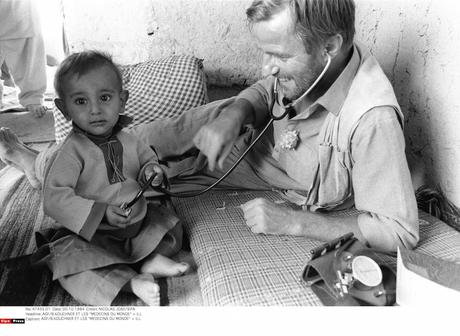
E.C: You named ISIS. What do you think is the future of ISIS?
B.K: To make a long story short, I think that we will get a new state somewhere between Syrian territory and Iraqi territory, because they already suppress the colonies at the borders. It’s up to the local population to fight against them, like the Kurds did. And I’m very confident with the Kurdish way of fighting against Daish. But we, and this is a must, should help the Kurdish people to fight against Daish. We tried - the Americans more than us - but we tried. We were involved in Iraq, we were involved everywhere, but it was not a big success. The poor Americans, they lost all the wars! Vietnam, Afghanistan and, of course, Iraq. So this is not a solution for us - to send ground troops - certainly not. Not ground troops, at the moment.
But if there were a real invasion, the answer of bombing the country like the Saudis did in Yemen, was another failure. They were killing the population more than the soldiers. We have to consider the internal battle between Shiite and Sunni people. Daish is now, unfortunately for the victims, killing Muslim people. Even if the danger is a world danger, they are killing Muslim people, so the Muslims they should react - with our help. But their future? I don’t know. I think there is no future for people as brutal as they are. I was very impressed when I went to Syria a few months ago to see a Kurdish woman fighting as a commander-in-chief in the city of Kobane. She was the commander of a thousand men and women, and they resisted to Daish, and they won! With a bit of help from the French people, and much more massively from the American people. We’ll see, I think that Bashar from Syria will not resist any more, I think that he will be replaced by another. The problem is Iran also fighting against Daish. Iran is a Shiite country fighting against ISIS - Sunni people, and this is a vicious circle. But we are exactly the way we were with the fighting and aggression against the protesters. This is a repetition. Don’t believe that religion is made for peace, religion is also made for war. I’ve no precise answer, but I believe that ISIS will lose. But immediately they will gain a big territory.
E.C: In 1971 , from "Doctors without Borders" you became a strong advocate of the concept of humanitarian intervention in order to protect civilian population from a sovereign state in countries which were unprotected and faced civil war, famine or genocide. Do you think this has been effective? What areas do you think could be improved?
B.K: Sometimes it has been effective. Like in Kosovo and Bosnia. Sometimes it has been negative, like in Iraq. We convince the UN system to vote in favour of the French resolution on the right to intervene. Because the right to intervene, according to my experience, was necessary to prevent war. But we never succeeded in preventing, except in Macedonia. In Macedonia in the middle of the Balkan war, we sent just a few hundred, and mainly Americans. We stopped the fighting, it was mainly by prevention. But for the rest, it’s always too late when we intervene, it’s always after the massacre. So I think that with the future of the right to interfere in protecting the people against massacre, unfortunately we were always waiting for the massacres and then we reacted. It was not always successful, not at all. Is Libya a good intervention? To protect Benghazi, the second city of Libya, against Gaddafi’s violent bombing by tanks, the right to protect the population is not binding and living at all. We had to have an agreement with the borders, and to stay and aid the people, with the agreement of the UN system. The right to interfere should go through the Security Council. Without a world agreement, any agreement is always coming from the only respectful international body, which is the UN. So I think there is a future for that if we are able to tell the people there is a risk of massacre somewhere, let’s try to stop the fire first. This is very, very difficult. Otherwise, we will be witnesses of massacres everywhere. Was it possible to protect the people in Iraq? Yes, it was the first success to get Saddam Hussein out. But after that, Shiite were the majority in Iraq, so Maliki was chosen after Allawi, who was elected as a secular guy. Maliki used the Shiism to get revenge on the Sunnis, so another time where it was not a good example. Is there a good dictator? This is a false question. Because of course it appeared, for the people, to calm down the situation, but it will not work for eternity. But was it better? My answer is no, but the answer of some is, ‘look, people were much more happy with the dictatorship’. The eternal question: For a doctor, and don’t forget that we were medical doctors. Medical doctors cannot accept massacres, just cannot. But that’s why, for me, the humanitarian conception is always a bit political. Protecting the people is political and of course, the humanitarian access is difficult. My answer is: Yes we have to protect, yes we have to act by prevention and, yes we have to act by information and education.
E.C: Did you achive more for human rights using your political platform or through your humanitarian work?
B.K: I think that it’s very complex to balance any inference of so-called political things. Human rights are political, and it will take years and years to explain to the people that the solution to the massacres is not hanging people or firing guns. There is no future for ISIS. Meanwhile there’s a sort of inside terror, and if you’re accepting terror, can you survive? At the beginning, yes, but after time you cannot. There is also no future for that. I’m in favour of human rights; I’m in favour of having respect for human life. I agree that religion as a peace process can work, but religion as a fight against the other religion, no. So we invented the right to intervene as a sort of medical dommage, but also as a political dommage. Medical passports were necessary to access the people at risk, to access the victims. Was it enough? No. But without a political vision it was impossible to force the door. Medical sensibility was affected by human rights; medical access was additional. Was it a political angle? Yes. Was it clearly political? No! This is impossible. Is it political dommage to save the people in the sea? No! This is a human dommage. And the right to interfere was a human intervention, for human victims. It’s not perfect, but it’s better than before, like some Jan Volski from the Polish government before the Second World War. He came to Churchill, Roosevelt having gone into an extermination camp and told them: ‘they are killing systematically’. But they did not intervene, they did not even bomb the railway going to Auschwitz. Why? Tell me why? For the same reason that we didn’t intervene for two years in the Mediterranean Sea. I don’t want to compare this directly to the migrants, but we still did not intervene. So, this is always a political decision. But the political decision is helped by sensible human reasons, by respect for human life. Who is respecting more human lives than a medical doctor? So it is an attitude.
E.C: You could be described as similar to the Dr. Schweitzer, the Doctor who attended to the sick in Africa and received the Nobel Peace Price in 1952. His motivations were to give back everything he received whilst he could. Is this your case? What are your motivations? Or perhaps you would describe yourself as “life-affirming" and a person who spreads vital values.
B.K: Well, I was writing a book on Schweitzer, he is a very interesting guy - the pioneer of this human access. Not for the same reasons that we had, he was a religious man. He was a protestant and a medical doctor. I’d say yes, he was one of our examples, and a good example. Of course at the same time it was before the discovery of antibiotics, and a lot people were angry because he didn’t use modern medicine. But at the same time it was good, he used the cultural methods of the people in Gabon. Of course, I visited his office in Lambaréné and sat at his table and I had a lot of admiration. My book on him is not finished, but Schweitzer gave us a good example for the time, and the time was a colonial time.
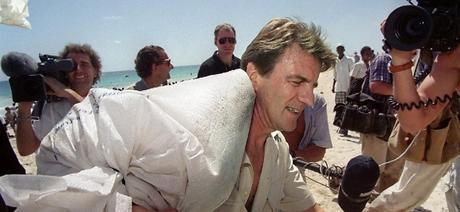
E.C: But what about your motivations?
B.K: My motivations are of course similar, but it was after the Second World War and after the Holocaust. And as I told you, nobody reacted against the Holocaust. When I was in Biafra, during the Nigerian-Biafran War, I saw the people coming to our hospital by the hundreds and hundreds. The bombing was targeting the civilian population. There was a blockade, so starvation was killing the babies in the thousands. So we were doctors, we had to react and protest, which we did and created Doctors Without Borders - just a few of us. I have to name my co-founder who was Max Recamier, he was not a political guy at all. He was a man of faith, he was a Catholic. But he was a doctor, so we did it together. It was more or less the same motivation but for me, it was more that my grandparents died in Auschwitz. And nobody protested. It was another time, but Schweitzer was a good example, not the perfect example – because there is no perfect example.
E.C: Do you think there is a solution to the Israeli conflict?
B.K: Yes, the solution is the creation of a Palestinian state. It is easy! But will it be possible? I cannot simply summarise, I don’t know if it’s completely too late. But the security of the Israeli is the security of the Palestinian. The Palestinian state would protect Israel; Israel would protect the Palestinian state. This is so obvious that it is ridiculous to find another solution. There is no other solution. Yes, for the time being the Israeli army is stronger than the other. But it will not last forever. So the solution is in between. I don’t say that the solution for Iraq or Iran is easy to say. But the creation of a Palestinian state is the beginning of all the solutions. We are in a real hurry. Unfortunately, for me, the Israeli people voted for Netanyahu. But my friends Tzipi Livni and Isaac Herzog - the chiefs of the Israeli Labor Party, were in favour of the Palestinian state, and they were right. So, on the other side, Mahmoud Abbas is an old man now. The new generation really want a Palestinian state, they are recognising Israeli people. Not only that, but they are meeting with them every day. This is ridiculous – it is a big, big crime not to recognize a Palestinian state. I know the story of Israel, yes they have the right to live, the right to be protected. This is my solution, that’s all. At the same time it is very difficult to understand the American political attitude to this. But President Obama wants to sign a document with Iran. I cannot be against peace; it is better than war. Let us see. For Israel it is a danger if Iran is following the line of setting up a nuclear weapon. I think to sign - if it is signed - at the end of the month, or at the beginning of July, I think that will be progress. Gaza was unacceptable, it did not change anything for some thousands of days of alienation. I know Hamas is not for peace, but I know that PLO is for peace. Let’s side with PLO!
E.C: What did you think about the position of Netanyahu?
B.K: Netanyahu was against the peace. Netanyahu is in favour of enlarging the borders in favour of settlement. We were close to the agreement with the former government, very close. I’m strongly in favour of the existence of the Israeli state, strongly in favour. But the basis of the Palestinian state is showing that they are not the country undermining Israel, not at all.
E.C: You’ve just arrived from Ukraine. What were you doing there?
B.K: I don’t know if I will do it, but I was in charge of offering a plan for changing the health system completely in Ukraine, like it was in Soviet Union and in Russia - a statist plan. I think we should mix public and private involvement under certain laws and under private health insurance, under public supervision. We’ll see, but there is a problem with Mr. Putin, who was not responsible for the separation between Russia and Ukraine, that was Gorbachev and Yeltsin. So we have to respect the border, and even if Russia is a bit different, the way they took over in fighting and bombing, remember, not only were they fighting but they missiled a Malaysian plane with Dutch people on board. It is not acceptable. I don’t know, we have a problem, and the solution is not war against Russia, certainly not. So is it sanctioning - economical sanctions? Partly, yes. And talk and talk, as we used to say, diplomacy.
E.C: What are your future proyects? Maybe a book? About...
B.K: I want to take some time to think about – and this is very arrogant of me to say so - my experience in mixing the political and the humanitarian. Having confidence in people but at the same time discovering that people love war. It’s like the most exciting experience for them, like a permanent merging and mixing male hormone through history, and though it’s a kind of caricature what I’m telling you, maybe it’s true. But I strongly think that you cannot separate humanitarian intervention from politics. I want the political people to be a more humanitarian, and I want the humanitarian to be more political. But they want to separate, you know why? Because of power! Having big NGOs gives you power. We are not all like Bill Gates, he’s a good example. I don’t want to insist too much, but remember what I said in your first question about developing Africa. Developing, developing; investing, investing. That’s the answer instead of letting them die in the sea, absolutely. We take tiny steps to start, we are starting with humanitarian, but humanitarian is not the solution of development, it’s a sort of generosity and charity. Okay, this is better than letting them die, but this is not the solution, the solution is development. So that’s why I was happy to be in Dakar for the setting up of the Dakar Bank, the people were waiting for that. It was a good signal in the modernization of Africa. So, we’ll see, because the solution is not to be a doctor instead of them or inventing the drugs in order to sell at high prices.
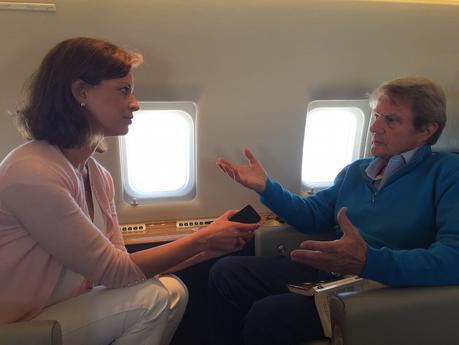
E.C: Could you tell me more about how Doctors Without Borders originated?
B.K: We were coming, young European doctors. French doctors. That’s why we went, we were French doctors and we were coming from a rich country; a country where we had been highly educated and we were had diplomas and we were working in hospitals, good hospitals, in France. And we discovered what? The reality of the world. And we discovered that our education was unable then to tell us what we have to do…what we had to do. What was our behaviour? We discovered that there were people dying of starvation, they were dying of misery. Of course they were also dying from bombs. We discovered a word: bomb. They were bombing the villagers, they were machine gunning all the highways, and they targeted the children. Every day there were violations of human rights, of course it was a civil war. So what were we supposed to do? To take care of the victims. OK, we took care of the victims from the bombing. It was not easy. A lot were dying, the others we tried to save. We played the role of doctors. Women and children, dying from bombing, okay, we helped. But after, we discovered that they were coming because of starvation, the children. We didn’t know about ‘Kwachmaco’ and ‘Marasmas’. The name of these illnesses were unknown to us real doctors. So the first time we set up a resuscitation unit for the children, so we tried to resuscitate them. Sometimes we succeeded. But then we had another hospital and then were was a flood of starvation they went back, resuscitated, to their villages. Then three months after, they came back another time with a different condition and the third time they all died. So what were we supposed to do? To say, ‘well, you know, we’re doctors and they came – doctors are waiting for the patients. First step: we went to the patients, across the border - across-the-border-doctors, doctors without borders. Then we protested politically. It was a big revolution because the doctors used to keep quiet. No, now it was not possible, the Hippocratic Oath is something between the patient and the doctor. Yes, you have to maintain ‘the secret’, but not during the massacres and it reminded me that during the Holocaust nobody protested. So we had to protest because the children – African black children were condemned because of the food blockade on both sides. There was a part of Nigeria completely at siege - that was our discovery. That’s why, coming back from Africa, we set up in ’71 because we were in ’68 and we had to regroup the people etc. We were obliged as doctors to play our role to exercise our duty. Our work. To be able to be a real doctor, we had, politically, to protest. Because there is always a way. They were dying from starvation, not because of natural disaster, because of a blockade by demand.

